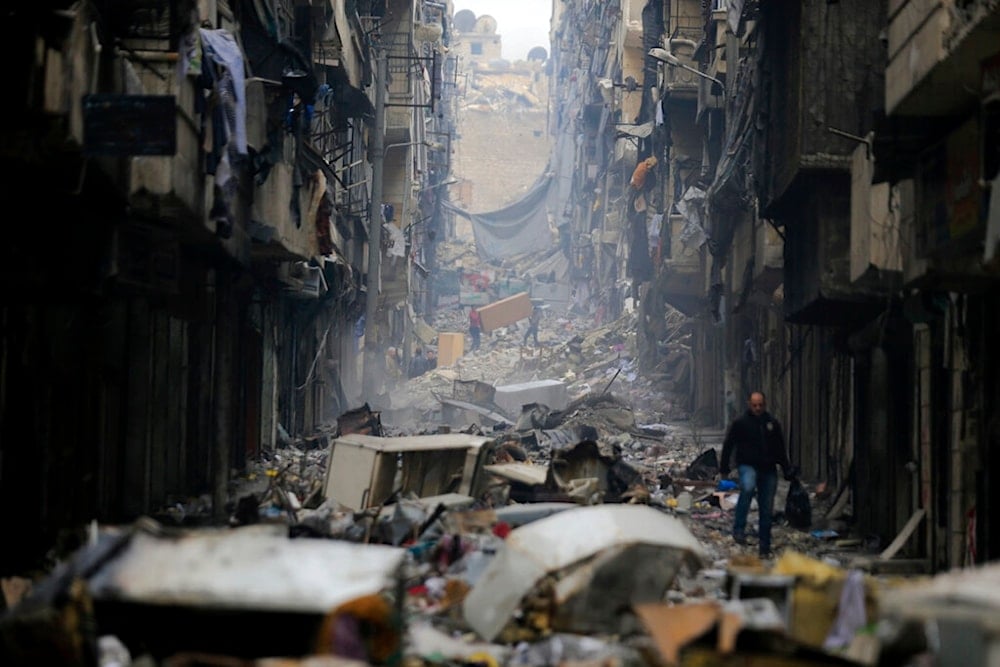UN urges rapid Syria reconstruction after Assad’s overthrow
The UN calls for urgent global support to rebuild Syria after Assad’s fall, warning that massive destruction threatens stability across the region.
-

Residents walk through the destruction of the Salaheddine neighborhood in eastern Aleppo, Syria, Friday, January 20, 2017. (AP)
The United Nations has called on the international community to urgently assist Syria’s reconstruction efforts, describing the scale of the post-war devastation as “massive” and warning that recovery will be critical to regional stability following the overthrow of former president Bashar al-Assad last December.
“The international community should definitely rush into rebuilding Syria,” said Rawhi Afaghani, the UN Development Programme’s (UNDP) deputy representative in Syria, in an interview with AFP during a visit to Geneva.
“Being able to help the country to rebound and come out of this war and destruction is for the Syrians themselves, but also for the stability and the good of the whole region,” he added.
A country in ruins
The 2011 war on Syria, in which numerous Western countries participated and funded terror organizations, killed more than half a million people and left much of the country’s infrastructure in ruins.
The World Bank this week estimated that rebuilding Syria could cost up to $216 billion, nearly 14 times the country’s pre-war GDP. Afaghani declined to put an exact figure on the reconstruction, but acknowledged the scale of the need is “massive.”
Across the country, local governors have reported urgent requirements for housing, schools, hospitals, electricity, and water infrastructure. The UN official noted that unexploded ordnance scattered across urban areas continues to complicate debris clearance and reconstruction work.
Refugee returns add strain to crippled infrastructure
More than one million Syrian refugees have returned from abroad, while nearly twice as many have gone back to their places of origin after being displaced internally, according to UN data.
While these returns signal cautious optimism, Afaghani warned that the influx is “putting a lot of pressure on the infrastructure, on the transportation, on the education, on the bakeries.”
“People are returning to destroyed houses or houses that are actually occupied by other people,” he said, cautioning that the strain could lead to “community tensions.”
At the same time, inadequate services and a lack of jobs are deterring many Syrians abroad from returning. “We thought there would be a much higher rate of return,” Afaghani said, noting that most returnees have come from neighboring Lebanon and Jordan, where refugees face increasingly difficult conditions.
From Europe, however, “we don’t see that massive return,” he added.
Hopes for stability through reconstruction
Afaghani expressed hope that rapid reconstruction could help foster stability under Syria’s interim authorities and encourage skilled expatriates to return.
“Those are high-skilled people; they can rebuild Syria,” he said. “They could also be a big, good influence in the whole region from an economic perspective, and from a peace-building perspective.”
The UNDP official emphasized that the future of Syria’s recovery depends on swift international engagement and inclusive rebuilding efforts aimed at restoring livelihoods, public services, and community trust.
Syria not seeking IMF loans
Syrian Finance Minister Mohammed Yisr Barnieh stated on Wednesday that Syria does not plan to borrow money from the International Monetary Fund or the World Bank anytime soon.
On the sidelines of the annual meetings of the IMF and the World Bank in Washington, Barnieh told reporters, "We have no intention whatsoever to borrow [from the IMF or World Bank]."
The finance minister further said that Damascus is currently focusing on financial discipline, but he did not rule out the possibility of eventually borrowing funds from either of the international financial organizations.
"I'm not excluding borrowing down the road, but now we have no intention whatsoever. We want to make sure that our in-house in order. We might borrow only for strategic projects where private sector finds it not attractive," he stated.

 4 Min Read
4 Min Read










